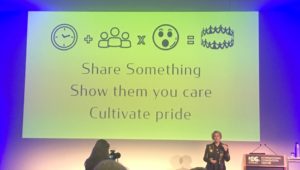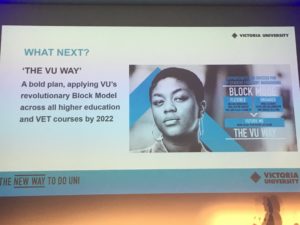EduTech Sydney 2019: A summary of FutureLearn’s learnings
Author: Fiona Reay, Development Partnership Lead at FutureLearn

Highlights of the EduTech conference included Sir Ken Robinson advocating for a further shift of the education system to no longer teach purely knowledge and subjects in schools, rather disciplines and competencies like team work, communication, resilience, creativity, etc.
Josh Nester (Education Director at SEEK and board member at FutureLearn) spoke on a panel of EdTech investors about how the future of degrees and microcredentials amongst universities could potentially be like airline alliances, allowing students to pick and choose their courses from around the world. He thought further investigation into the value chain of the learning experience would be useful (ie student services), and career readiness training like soft skills would help with career impact and more return on investment for learners.
UNSW global ambitions to help the student experience
 Ian Jacobs VC Professor from the University of New South Wales (UNSW) spoke of the need to invest more in public education programmes, particularly with the growing need for education in sub-saharan Africa. He spoke of their investment in African campuses and how they set fees at the local market rate, alongside looking to produce digital content that’s high audio quality (rather than video) for better accessibility.
Ian Jacobs VC Professor from the University of New South Wales (UNSW) spoke of the need to invest more in public education programmes, particularly with the growing need for education in sub-saharan Africa. He spoke of their investment in African campuses and how they set fees at the local market rate, alongside looking to produce digital content that’s high audio quality (rather than video) for better accessibility.
Rachel Abel, General Manager of Student Experience at UNSW launched the movement #belongisbetter for communities within universities to improve the learner experience. With a focus on international students – it’s tailored like a new soft skills program to help with interpersonal skills. Her research shows the formula is: time spent + proximity to the student x emotional intensity = belonging
A new way for first-year study – a series of sprints

Victoria University (VU) explained how they revolutionised their first year of undergraduate study by mimicking more of the modern workplace working environment using the “block model” providing “sprints” of courses each semester (a 4-week block each with assessment). They got rid of ‘exam period’ entirely. The new delivery model took 8 months of preparation before student rollout, and once launched “The VU Way” went viral with a 12% increase in applications for the new kind of “first year uni”. VU teach core competencies like how to write a report, exam prep, numeracy, career development in “complementary stream” alongside the ‘one course at a time’ model.
Acting VC of VU, Marcia Devlin, explained by stripping things back to the essentials only, they now have the happiest students they’ve ever had and reduced the failure rate from 26% to 13% – a good rating for their western suburbs of Melbourne demographic. VU’s staff are now organised in multidisciplinary teams and not via subject – reducing “cliques” forming – and they have a randomised allocation of line management.
To learn more about the conference visit EduTech Sydney




